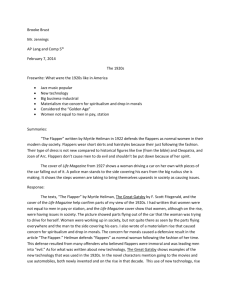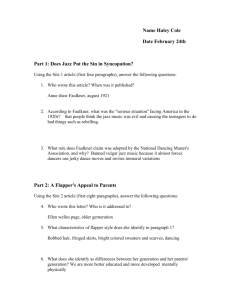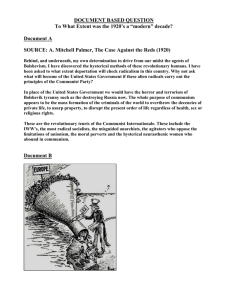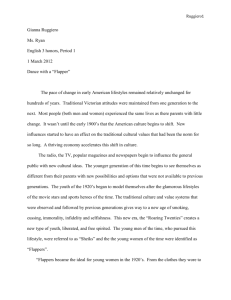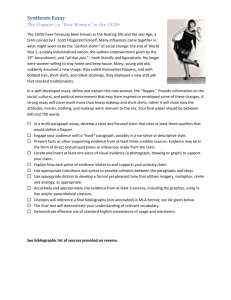Last Call: Prohibition and the Alcoholic Republic
advertisement
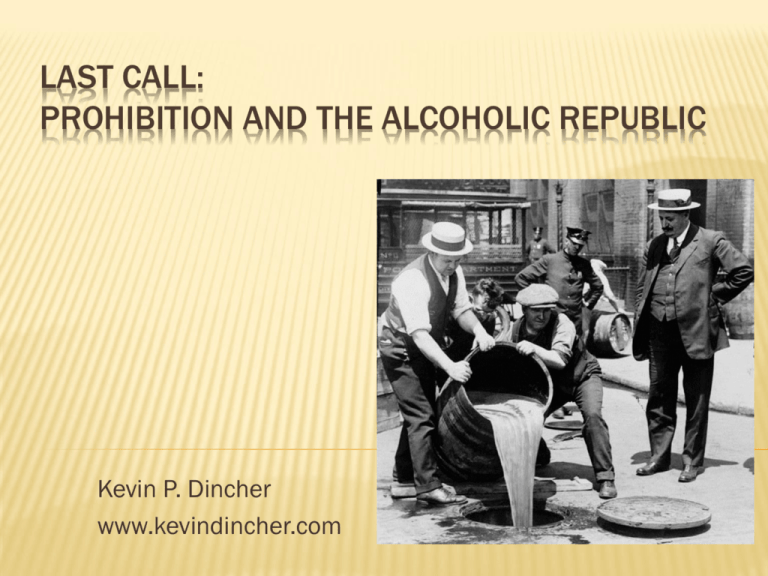
LAST CALL: PROHIBITION AND THE ALCOHOLIC REPUBLIC Kevin P. Dincher www.kevindincher.com PROHIBITION Enshrine social policy in US Constitution Alcohol = major source of social ills Poverty, divorce, violence, gambling, prostitution, other crime “Others” – “Undesirables” Immigrants (Irish, Italians, Eastern Europeans, Catholics) Blacks Purpose Fix what was wrong with America by fixing the American people Change American’s attitude Control American’s behavior PROHIBITION Alcohol consumption decreased in the 20th Century 19th Century Americans consumed 3x as much alcohol per capita as today But really caused by Prohibition? Consequences Culture Crime and corruption Women Prohibition and CULTURE Prohibition and CRIME AND CORRUPTION CRIME AND CORRUPTION Family of Carl and Christina Behle, 1913 CRIME AND CORRUPTION CRIME AND CORRUPTION George Remus (1874 – 1952) 1874: Born in Germany 1879: Immigrated to Chicago 1888: Worked at a pharmacy 1893: Bought the pharmacy King of the Bootleggers Bought 2nd pharmacy 1898: Illinois College of Law 1899: married Lillian Klauff 1900: Romola Remus CRIME AND CORRUPTION If there ever has been a bigger bootlegger than Remus, the fact remains a secret. Remus was to bootlegging what Rockefeller was to oil…” St. Louis Post Dispatch CRIME AND CORRUPTION Romola Remus (1900 – 1987) Wizard of Oz, 1908 CRIME AND CORRUPTION 1904: Admitted to Illinois Bar Famous criminal defense attorney 1920: $50,000/year $245,000/year in 2013 dollars 1918: Divorced Lillian Imogene Holms Married Imogene Holms CRIME AND CORRUPTION George Remus Prohibition Defending accused bootleggers Arbitrariness of judge Impressed by corruption 1920: Relocated to Cincinnati Cincinnati: 40,000 people Newport: 30,000 people 30,000 speakeasies CRIME AND CORRUPTION Cincinnati 80% of America’s “bonded liquor” stored in distillery warehouses within 300 mile radius Government withdrawal permits to sell to drug companies for medicinal purposes Remus: Bought up distilleries Created own drug company in Covington Created own trucking company Own men hijacked delivery trucks Distribution center: 50 acre farm “Death Valley” INCREASED CRIME Cincinnati 80 % of America’s bonded liquor stored in distillery warehouses within 300 mile radius Government withdrawal permits to sell to drug companies for medicinal purposes Bought up distilleries; established own drug company in Covington; created own trucking company Own men hijacked delivery trucks Distribution center: 50 acre farm “Death Valley” 3000 employees – 3 shifts/day $80,000/day Glenn Fleshler as Remus in Boardwalk Empire CRIME AND CORRUPTION Death Valley Farm Distribution center 50 acre farm INCREASED CRIME Government Bribes 1921: began meeting with Jesse Smith Member of Warren G. Harding's “Ohio Gang” Teapot Dome Scandal Unofficial assistant to US Attorney General Harry Daugherty $250,000 in bribes from Remus Withdrawal permits Protection from prosecution Ed Jewett as Smith in Boardwak Empire INCREASED CRIME Government Bribes 1921: began meeting with Jesse Smith Member of Warren G. Harding's “Ohio Gang” Teapot Dome Scandal Unofficial assistant to US Attorney General Harry Daugherty $250,000 in bribes from Remus Withdrawal permits Protection from prosecution Christopher McDonald as Daugherty in Boardwalk Empire INCREASED CRIME George Remus Income: $6million a year 1922: New Year’s Party New supply depot in Ohio 9 distilleries in Cincinnati Network from Buffalo, NY to Glendale, CA 100 couples All the men with diamond watches Each guest's wife a brand new car June 1923: Similar party 100 couples Gave each female guest a new Pontiac INCREASED CRIME 1925: arrested for violation of the Volstead Act Jury deliberated for 2 hours Sentenced to 2 years in jail Franklin Dodge 1927: Imogene divorced Remus George Remus, Romola Remus, and co-council Charles Elston The jury deliberated only 19 minutes before acquitting him by reason of insanity Prohibition and WOMEN AMERICAN WOMEN 18th and 19th centuries “A Woman’s place is in the home.” Women worked and socialized primarily in the home Economic necessity Women’s patriotic role AMERICAN WOMEN American Boycott of British Goods (1769) Could only succeed with women’s support and active participation Recognize women as political Women could be patriots and had a key role in the patriot cause Domestic duties and responsibilities have political ramifications Consumption behaviors had political implications, and women make political decisions whether they intend to or not AMERICAN WOMEN American Boycott of British Goods (1769) Reinforced “Domestic sphere” of women “Public sphere” of men Changed the nature of “women’s work” Politicized the “domestic sphere” AMERICAN WOMEN Republican Motherhood Linda Kerber Department of History University of Iowa Philosophy about the role of women in the emerging United States before and after the American Revolution Women’s political role in the domestic sphere AMERICAN WOMEN Linda K. Kerber Women of the Republic: Intellect and Ideology in Revolutionary America (1997) No Constitutional Right to Be Ladies: Women and the Obligations of Citizenship (1999) AMERICAN WOMEN 18th and 19th centuries “A woman’s place is in the home.” FLAPPERS A "new breed" of young Western women in the 1920s Actress Louise Brooks (1927) • Flaunted their disdain for what was then considered conventional/acceptable behavior. • Flappers = scandalous FLAPPERS When someone violates the status quo, we get up in arms, but we also make the scandalous act speakable. Six Women of a Dangerous Generation Judith Mackrell FLAPPERS The women who defined this age would presage the sexual revolution by nearly half a century and would shape the role of women for generations to come. FLAPPERS Josephine Baker 1906-1975 American-born French dancer, singer, actress FLAPPERS Tallulah Bankhead 1902-1968 Actress and political activist . FLAPPERS Diana Cooper 1892-1986 British actress and socialite . FLAPPERS Nancy Cunard 1896 -1965 British write, heiress and political activist . FLAPPERS Zelda Fitzgerald 1900 – 1948 American novelist, short story write, poet and dancer Icon of the 1920’s: “The First American Flapper” FLAPPERS Tamara de Lempicka 1898 – 1980 Polish Art Deco painter First woman artist to be glamour star . FLAPPERS Suffragettes thought Flappers were vapid and silly Disengaged from politics Overturning Victorian roles Result of social change Promoted further social change FLAPPERS Fashion Clothing Lingerie Hair Make-up Jewelry Language Slang Swearing FLAPPERS “Vices” Drank Smoked Causal sex Actress Louise Brooks (1927) Petting parties Drove automobiles Rode bicycles Listened to jazz Got jobs FLAPPERS 1631: flap = prostitute 1890s: popular slang in England • very young prostitute • any lively mid-teenage girl 1907: theatrical slang for acrobatic young female stage performers Violet Romer, born in 1886 in San Francisco, California, was an American actress, dancer and flapper 1908: The London Times • “a young lady who has not yet been promoted to long frocks and the wearing of her hair 'up'“ 1912: a girl who has "just come out.” (debutant) AMERICAN WOMEN 1920: “Flapper” had taken on the full meaning of the flapper generation style and attitudes. "the social butterfly type… the frivolous, scantily-clad, jazzing flapper, irresponsible and undisciplined, to whom a dance, a new hat, or a man with a car were of more importance than the fate of nations". Actresses such as Joan Crawford built their careers on the flapper image AMERICAN WOMEN Vices: scandalous dances Charleston The Shimmy The Bunny Hug The Black Bottom Joan Crawford AMERICAN WOMEN Clara Bow Blondie Boopadoop: a carefree flapper girl who spent her days in dance halls 1920S Movies Actresses Movies about Flappers One Summer: America, 1927 Bill Bryson Tabloids Sensational crime Celebrity gossip FLAPPERS AND AMERICAN WOMEN 1930S FLAPPERS AND AMERICAN WOMEN Prohibition and DRINKING Alcohol AN AMERICAN TRADITION AN AMERICAN TRADITION 1607: Jamestown, Virginia 1620: Pilgrims. Plymouth Colony 1630: Puritans, Massachusetts Bay Colony 1648: Pilgrims + Puritans = Congregationalist AN AMERICAN TRADITION Alcohol Use in Colonial Times Provided warmth Improved one’s outlook Enlivened social events Weddings Christenings Election-day gatherings Funerals AN AMERICAN TRADITION Colonial Americans Believed that alcohol was beneficial Alternative to suspect water Alcohol cured sickness, aided digestion and strengthened the weak. Whiskey was taken for colic and laryngitis. Hot brandy punch addressed cholera. Rum-soaked cherries helped with a cold. Pregnant women and women in labor were given a shot of whiskey to ease their pain. AN AMERICAM TRADITION Colonial Americans Started the day with a pickme-up Drinking was everywhere: Enjoyed a midmorning whistle wetter Libations at luncheon, in the afternoon, and at supper, imbibed either at home or at a local tavern. At home, work, school In the fields In shops At sea and in military camps. 1639: Harvard President Nathaniel Easton was fired when the school didn’t supply enough beer to students AN AMERICAN TRADITION Tavern Culture Informal socializing Social, sporting, cultural organizations Business Politics Prohibitions Sabbath Election days Cultural Mores Men only AN AMERICAM TRADITION Drunkenness versus Moderation Pilgrims/Puritans/Congregationalists: Attacked drunkenness Alcohol as a necessary part of life 1622 – Virginia Company of London Complained to Governor Francis Wyatt at Jamestown that drinking hurt the colony. James Oglethorpe, founder of Georgia No rum, no slaves, no lawyers and no Catholics AN AMERICAM TRADITION Drunkenness versus Moderation Benjamin Franklin called for moderation "nothing is more like a fool than a drunken man” 200 different names for being drunk AN AMERICAM TRADITION Addled Afflicted Biggy Boozy Busky Buzzey Cherubimical Cracked Halfway to Concord, Bowz'd, Cherry merry Fetter'd Lappy Mountous See a flock of moons Be right before the wind with all you studding sails out Thump over the Head with Sampson's Jawbone AN AMERICAN TRADITION Great Awakenings in the United States Periods 1st: 2nd: 3rd: 4th: of Intense Religious Revival 1730 – 1755 1790 – 1840 1850 – 1900 1960 – 1980 Significantly in the US Politics impacted the development of religion and social reform movements Kevin P. Dincher AN AMERICAN TRADITION The Great Awakenings Personalized Spirituality Personal revelation and introspection Emotional – ecstatic religious experiences Personal authority/independence Personal morality Revival Meetings Millennialism (2nd, 3rd and 4th) Personal Repentance Social Reform Evangelical Emphasis on the Bible “Return to Fundamentals” Calvinist 71 Kevin P. Dincher AN AMERICAN TRADITION The First Great Awakening (1730 – 1755) George Whitfield (1714 – 1770) Jonathan Edwards (1703 – 1758) Methodism Evangelical Movement Open-air Revival Meetings 1732: Public Lecture: God Glorified in Man’s Dependence 1741: Sinners in the Hands of an Angry God The End for which God Created the World Gilbert Tennent (1703 – 1764) Presbyterianism: New Lights 72 Kevin P. Dincher AN AMERICAN TRADITION The First Great Awakening: Alcohol? Not a prohibition/temperance movement 2nd Great Awakening Personal reform Moderation temperance and 73 The Western Frontier – and the Cities FROM “TAVERN” TO “SALOON” THE WEST French and Indian War (1754–1763) Seven Years War Proclamation Line of 1763 Appalachian Mountains Post-Revolution Expansion THE WEST The Whiskey Rebellion 1791: tax protest Western Pennsylvania
